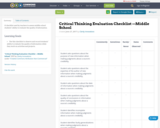
A checklist used by teachers to assess middle school students’ ability to evaluate the quality of information.
- Subject:
- Applied Science
- Arts and Humanities
- English Language Arts
- History
- Social Science
- Material Type:
- Assessment
- Date Added:
- 06/27/2017

A checklist used by teachers to assess middle school students’ ability to evaluate the quality of information.

An interactive applet and associated web page that demonstrate the properties of a cube. A 3-D cube is shown in the applet which can be interactively manipulated using the mouse. Research has shown that some younger students have difficulty visualizing the parts of a 3D object that are hidden. To help with this, the student can rotate the cube in any axis simply by dragging it with the mouse. It can also be 'exploded' - where a slider gradually separates the faces to reveal the ones behind. The cube can also be made translucent so you see through it to the other side. Applet can be enlarged to full screen size for use with a classroom projector, and printed to make handouts. This resource is a component of the Math Open Reference Interactive Geometry textbook project at http://www.mathopenref.com.

According to Montenegro & Jankowski, 2017, culturally responsive assessment is an assessment that is mindful of the student populations the institution/school serves, using language that is appropriate for all students when developing learning outcomes, acknowledging students’ differences in the planning phases of an assessment, and being intentional in using assessment tools and results to improve learning for all students. This module will provide explicit instructions to guide your thinking about the relationship between assessment and instruction.The goal of this course is to introduce K-12 Educators and Higher Education faculty to using standards and assessment alignment to support all types of learners.
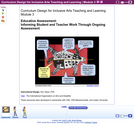
This module of the course focuses on educative assessment. Educative assessment is designed to provide educators and learners with feedback to improve their work. In this module you will learn the UbD-DI principles of authentic assessment and understand how UDL integrates with them. You will then use a protocol to generate valid assessment criteria based on a review of student work samples.
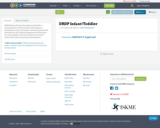
DRDP (Desired Results Developmental Profile) - a developmental continuum from early infancy to kindergarten entry. a formative assessment instrument developed by the California Department of Education for young children and their families to be used to inform instruction and program development.
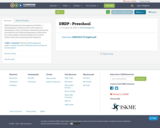
DRDP (Desired Results Developmental Profile) - a developmental continuum from early infancy to kindergarten entry. a formative assessment instrument developed by the California Department of Education for young children and their families to be used to inform instruction and program development.
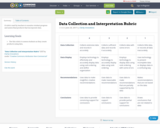
A rubric used by teachers to monitor student progress and assess final products that incorporate data.
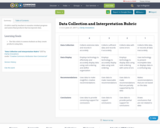
A rubric used by teachers to monitor student progress and assess final products that incorporate data.
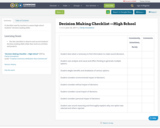
A checklist used by teachers to assess high school students’ decision making skills.
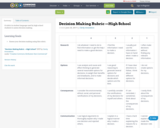
A rubric in student language used by high school students to assess decision making.
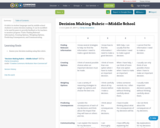
A rubric in student language used by middle school students to assess decision making. It can be modified to be used by peers to provide feedback or by teachers to monitor progress. Traits: Finding Relevant Information, Creating Options, Weighing Options, Predicting Consequences, and Communicating.

This is an advanced graduate-level seminar that will analyze the effectiveness of development and planning theories from the perspective of practitioners who implement projects and policies based on such theories. The course will be organized around 12 implementation puzzles, which should be considered for re-theorizing both developmental and planning processes.
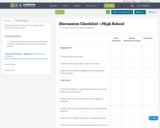
A checklist used by teachers to assess high school students’ discussion skills.
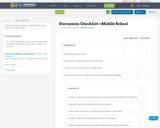
A checklist used by teachers to assess middle school students’ discussion skills.
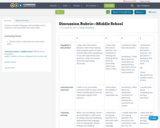
A rubric in student language used by middle school students to self-assess their discussion skills.
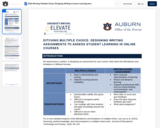
This handout will help you think through the process of converting an online multiple choice test into a writing assignment.
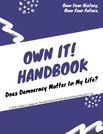
Does Democracy Matter in My Life?- Own It! Handbook is the guide book for a transformative after-school, trauma-informed enrichment program. It provides five lessons & activities about essential elements of American democracy since the 1780s. Own It! also nurtures academic skills, personal growth and leadership. It uses history to connect our past to our future, as part of the Own Your History® (OYH) Collection. But Own It! is not “school” and it differs from traditional approaches to history. Own It! helps students learn more about themselves, as well as their community and the country. Own It! enhances students’ engagement in being creative, making things happen, and achieving goals. Its mission is to help them step up and enrich their lives, especially by understanding that they live in history.
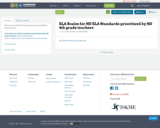
ELA Scales for ND ELA Standards prioritized by ND 4th grade teachers.
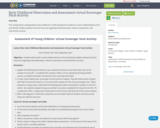
This activity allows undergraduate early childhood or child development students to work collaboratively to find and identify reliable national and local resources regarding child observation, referral, assessment, and intervention services.
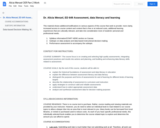
Education: Assessment, Data Literacy and Learning Course Materials
ED 649 Assessment, Data Literacy, and Learning
Focus is on creating and selecting high quality assessments, integrating assessment practices and results into actions and planning, and building and enhancing data literacy skills related to assessment.
Course Outcomes
explain the historical foundations of assessment and data literacy in education
explain the difference between assessment literacy and data literacy
distinguish the purposes and forms of assessments for and of learning for different kinds of learning targets
describe the relationship of assessment to curriculum and instruction
apply strategies to construct valid and reliable assessments
understand how to select appropriate assessment data
analyze and synthesize assessment data for decision making purposes